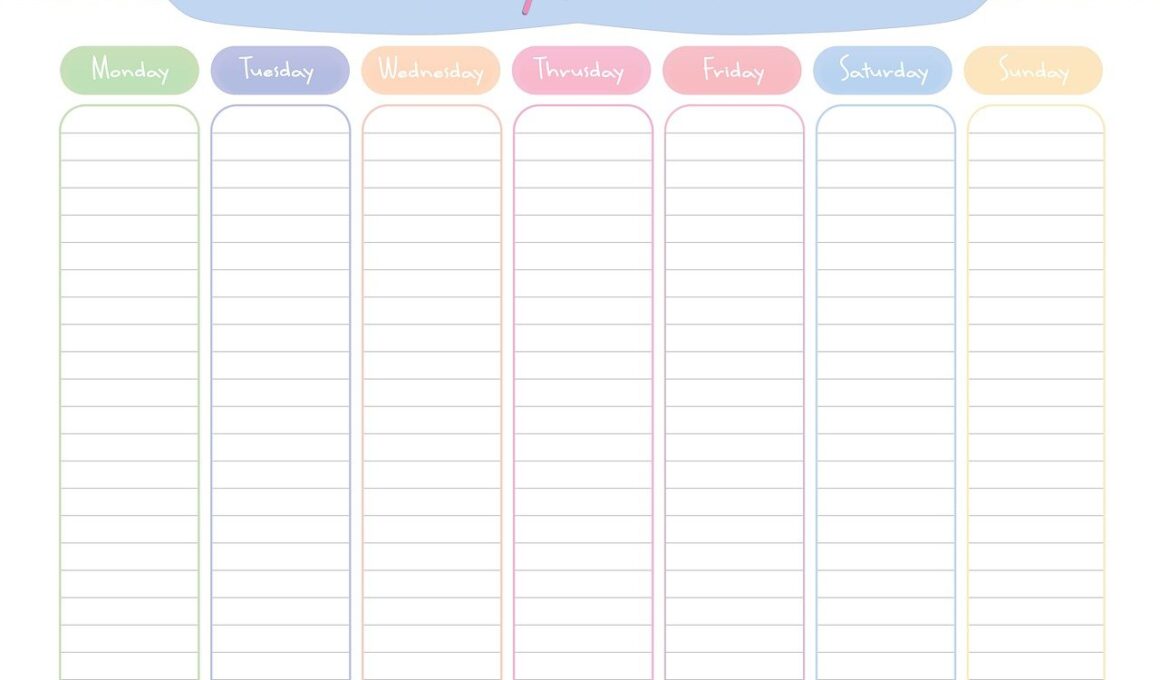How to Prioritize Expenses in a Weekly Budget
When creating a weekly budget, understanding how to prioritize expenses is essential for financial health. Start with a list of all your necessary expenses. These typically include rent, utilities, groceries, and transportation. By identifying fixed expenses, you can better understand what you need to allocate funds toward immediately. After listing these, rank them based on urgency and necessity. Distinguishing between what you need and what you want can be crucial. Needs are non-negotiable, while wants can sometimes be postponed. Moreover, considering the frequency of these expenses can help streamline your budget. For instance, a monthly expense like a subscription might not factor in the weekly budget directly, but setting aside a portion weekly can help cover it when it’s due. Once fixed expenses are accounted for, assess your variable expenses, like entertainment and dining out. It’s okay to allocate some funds here, just ensure it doesn’t compromise your essential needs. Using budgeting apps can aid in tracking these categories, making it easier to visualize and adjust spending priorities as needed.
Next, it’s important to develop a savings strategy that works alongside your weekly budgeting goals. Prioritizing your savings can help cushion against unforeseen expenses. Ideally, aim to include it in your budget as a fixed expense. Setting aside a certain percentage of your income, even a modest amount, can contribute significantly over time. Establishing a separate savings account can also make it easier to keep those funds untouched, ensuring they’re available for emergencies or future investments. Consider adopting the 50-30-20 rule, which suggests allocating 50% of your income to needs, 30% to wants, and 20% to savings. This simple formula can help you maintain a balanced spending strategy. As you gain confidence in your budgeting skills, revisit your outlined priorities frequently to make any necessary adjustments. If unexpected expenses arise, it’s vital to reassess where your money goes each week. By doing so, you remain flexible and can adapt quickly, preventing overspending in any category. Establishing these practices can significantly enhance your financial management.
Tracking and Adjusting Your Weekly Budget
To effectively prioritize expenses in your weekly budget, it’s crucial to implement tracking mechanisms. Regularly monitoring where your money goes allows you to identify patterns that could be adjusted. Allocate time each week to review your expenditures compared to your budget. Create an expense tracker using a spreadsheet, an app, or even a simple notebook. This will enable you to recognize both overspending and savings opportunities. If you notice certain categories consistently going over budget, consider seeking areas to cut back. For instance, dining out can often balloon costs during the week, so reducing that frequency can free up funds for necessary expenses. Additionally, analyze your variable expenses, such as entertainment or shopping habits. Do you find you spend more on impulse buys than planned? If so, you may want to include measures that limit those instances. Committing to a clear spending plan can enhance your budgeting skills, ultimately leading to financial stability. Prioritizing expenses becomes easier once you establish a clear track record, enabling informed decisions for future weeks.
One effective method for prioritizing weekly expenses is establishing financial goals. By setting specific, measurable goals, you can make informed decisions about your spending and budgeting. Suppose you aim to save for a vacation or pay down debt. In that case, you might prioritize those savings over certain discretionary purchases. This approach adds motivation to the budgeting process, as each decision made in your week must align with these overarching goals. Display these goals somewhere visible, like your fridge or workspace, to serve as a daily reminder. Moreover, it can be beneficial to reassess your financial goals regularly. As life changes, so can your priorities, and your weekly budget must reflect that. Are you considering buying a home? Or perhaps planning for a big event? Adjust your expense priorities accordingly. Introduce a method for tracking these goals and your spending, so you maintain a strong financial focus. Comparing the progress towards goals against your expenditures will reinforce positive budgeting behaviors and generate a clearer view of your financial landscape. This strategy transforms budgeting from a chore into a pathway towards achieving your dreams.
Incorporating Needs versus Wants
Understanding the difference between needs and wants plays a vital role in successful budgeting. When you prioritize expenses in a weekly budget, identifying these categories is crucial. Needs encompass essential items for survival and daily living, like food, healthcare, and utilities. In contrast, wants represent optional expenses that can enhance your lifestyle, such as dining out, subscriptions, or luxury items. Determining this distinction involves evaluating the implications of each item on your financial health. For instance, while a new pair of shoes might feel urgent, ask yourself if they are truly needed or merely desired. Base your spending decisions on priority rather than impulse. To streamline your weekly budget effectively, create two distinct lists: one for needs and one for wants. Assess the totals and ensure your needs are sufficiently funded first. Once that’s verified, then allocate any remaining funds towards wants with caution. This method reinforces discipline in spending and instills a stronger sense of financial responsibility, ensuring that your budget remains balanced and sustainable week after week.
Another useful strategy is to embrace the concept of delayed gratification. This principle emphasizes making conscious decisions about spending in relation to your budget. By postponing certain purchases, you give yourself time to evaluate whether they are necessary and align with your financial goals. Applying a waiting period of a week or two can help you resist impulsive shopping urges. It can prevent regret and promote mindfulness in spending. Once the waiting period has lapsed, reassess your desire for that item. Are you still inclined to buy it? If so, consider whether your budget can accommodate it without sacrificing essential expenses. Additionally, utilize this time to weigh its value compared to your current financial priorities. Incorporating delayed gratification techniques into your weekly budget can bring clarity and structure to your spending. Mindful spending hinges on understanding your motivations and desires, allowing you to align them with your financial objectives. Ultimately, this enhances your overall financial wellbeing and encourages healthier habits that last beyond just this week.
Conclusion: Maintaining Balance in Budgeting
As you work to prioritize expenses in your weekly budget, remember that balance is key. Implementing a variety of strategies allows you to adapt your approach based on changing circumstances and priorities. Revisit your budget regularly to reflect your evolving needs, goals, and lifestyle changes. Make it a habit to review your financial situation weekly to ensure you’re on track and to adjust accordingly. This ongoing reflection can foster healthy financial habits and a more comprehensive understanding of budgeting principles. Incorporating your essential expenses and savings while allowing for controlled discretionary spending sets the stage for effective financial stewardship. You’ll not only meet your obligations but also enjoy your financial journey. Consistent practice and accountability reinforce positive changes, cultivating a robust budgeting practice that supports your long-term goals. Remember, each budget is unique to each individual’s circumstance, so tailor your approach to fit your needs. Ultimately, prioritizing expenses in your weekly budget means making informed choices that reinforce not just immediate survival, but long-lasting financial success.
Creating and sticking to a budget is not simply about restricting spending but about enhancing life quality. By prioritizing expenses wisely, you can ensure that you meet your essential needs while still enjoying your wants. Building a sustainable budget takes time and continuous adjustments, so don’t be discouraged by initial challenges. Learn from setbacks, and celebrate small victories along the way. Developing healthy budgeting habits will not only reduce financial stress but will also create a foundation for responsible financial management. Use this opportunity to establish a strong relationship with your finances and use budgeting as a tool to empower your financial decisions. The more proactive you become, the more stability you will find in your financial situations. In addition, engage in discussions with family members about budgetary choices, fostering a community where everyone shares responsibility. Communication can lead to mutual understanding and cooperative planning, making the process less daunting. Finally, remember that budgeting is a lifelong skill. As you prioritize and adapt expenses, you become more adept at navigating life’s financial landscape, ultimately leading to a more fulfilled and financially secure future.


